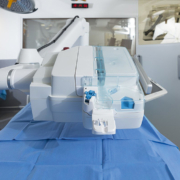Medical robotic platform
Robocath, a company that designs, develops and commercializes cardiovascular robotic systems for the treatment of vascular diseases, has recently announced that its first robotic solution, R-One, met all its primary efficacy and safety endpoints in the first pre-clinical study. The prospective, randomized, controlled, multi-operator study evaluated the efficacity and safety of the robotic system compared to a manual procedure. Results showed that there was no significant difference between the procedures for all the primary endpoints and that R-One achieved 100% technical success, no major adverse cardiac events (MACE), total protection from X-rays for the operator as well as no arterial damage. This study demonstrates how safe, intuitive and easy to use this solution is with only a one-minute difference in procedure duration between the two groups. R-One will bring huge benefits during Percutaneous Coronary Interventions (PCI) to both patients, in terms of intervention precision, and operators, with increased comfort. R-One is expected to be commercially available at the end of the year in Europe and the Middle East. The pre-clinical prospective, randomized, controlled, multi-operator study was designed to demonstrate the non-inferiority of R-one compared to manual percutaneous coronary intervention (PCI) in a porcine model. In total, 42 arteries were stented either manually (21) or with robotic assistance (21); 24 arteries were analysed for patency and flow at 30 days and 24 arteries went through histopathological analysis. Endpoints included technical success and MACE.


